This is the first line treatment for a patient presenting with erythmatous rash that has been progressively enlarging since they returned from a camping trip in Massachusetts two weeks ago, having the following appearance:
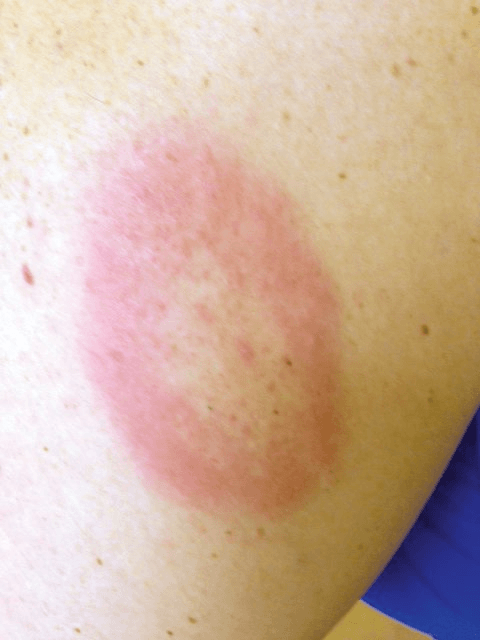
What is doxycycline?
Key Point:
This patient has an enlarging erythematous skin lesion with central clearing suggestive of erythema migrans and should be prescribed doxycycline. Erythema migrans is the most common presentation of Lyme disease, seen in up to 80% of patients, although an initial heterogenous patch of erythroderma is more common than the classic target-like appearance.
Early localized Lyme disease and southern tick–associated rash illness present with erythema migrans and are clinically indistinguishable; therefore, patients with erythema migrans should be treated with doxycycline, which is effective in both conditions.
In diagnosing achalasia, this is the intial test AND pathognomic finding
What is barium esophagogram demonstrating “bird’s beak"?
This lung disease is diagnosed with an FEV1/FVC ratio less than 70%
What is an obstructive pulmonary disease?
The cardiac arrhythmia diagnosed with the following EKG
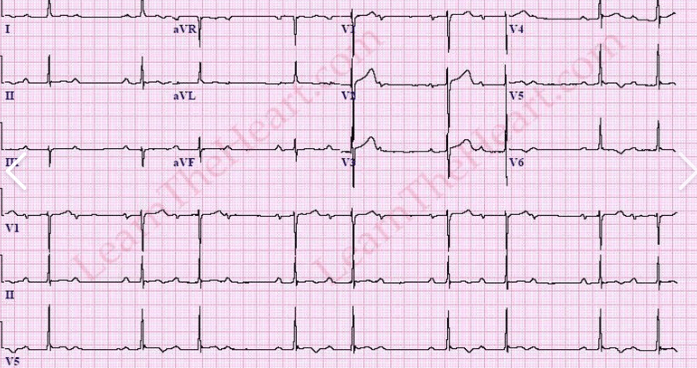
What is second degree AV block, Type 1, or Wenckeback?
Type of isolation for TB
What is airborne isolation/precuations?
This is the time window for administering TPA in acute ischemic strokes
What is 3 - 4.5 hours?
This disease is diagnosed with the following serology:
+ve HBsAg
+ve Anti-HBc
-ve IgM HBcAb
-ve HBsAb
What is Chronic Hepatitis B Infection?
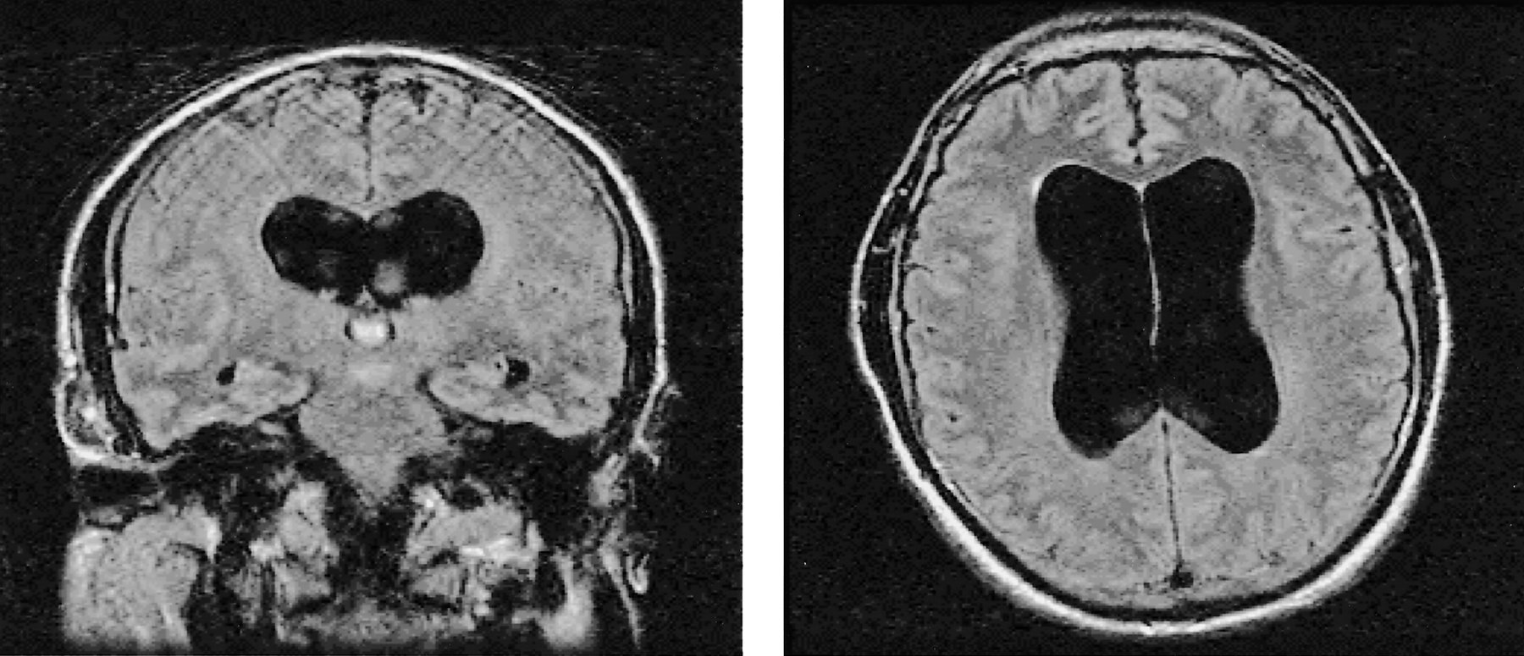 This is the indicated treatment for a patient having memory and concentration difficulties; urinary urgency, frequency and incontinence; a wide, slow, shuffling gait; and the following CT brain findings:
This is the indicated treatment for a patient having memory and concentration difficulties; urinary urgency, frequency and incontinence; a wide, slow, shuffling gait; and the following CT brain findings:
What is large-volume lumbar puncture?
Large-volume lumbar puncture is indicated in this patient with likely normal pressure hydrocephalus (NPH). NPH is the most likely diagnosis in the setting of the triad of gait abnormalities, cognitive impairment, and urinary disturbance, especially when neuroimaging studies show enlarged ventricles out of proportion to cortical atrophy. NPH is a potentially reversible cause of cognitive and motor decline.
This is a poor prognostic indicator for acute pancreatitis (1 of 3)
What is elevated serum:
BUN>20
Hct>44%
Elevated serum creatinine
This pulmonary disease is typically diagnosed with these chest x-ray findings
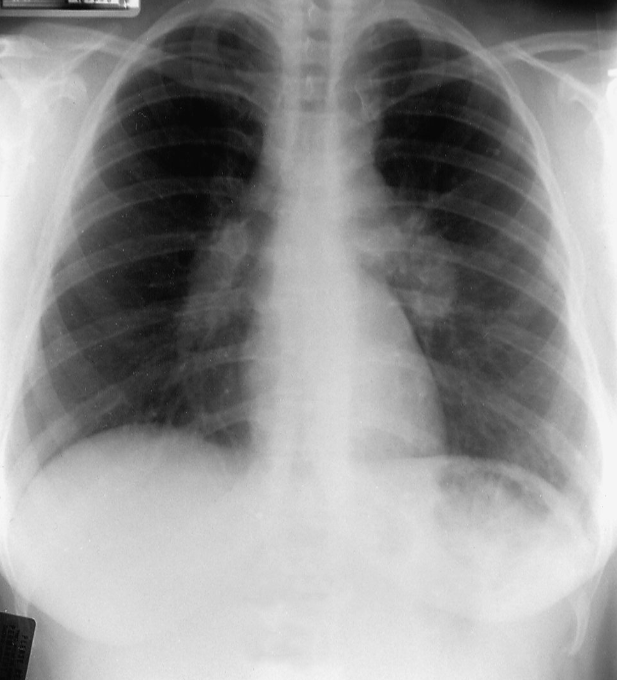
What is sarcoidosis?
A device that would be indicated for a patient with NYHA II/III, EF <35% after optimal medical therapy x6 months, and life expectancy of 1 year.
What is an AICD?
This is the next diagnostic test for patient with positive TST or IGRA
What is Chest Xray?
This is the initial test to perform while treating restless leg syndrome.
What is an iron panel?
The most appropriate treatment for a liver transplant patient treated with mycophenolate mofetil and prednisone, who as developed painful swallowing and the following EGD findings:
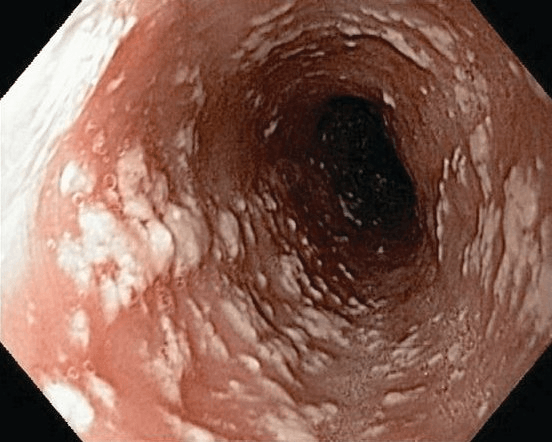
What is large-volume lumbar puncture?
Large-volume lumbar puncture is indicated in this patient with likely normal pressure hydrocephalus (NPH). NPH is the most likely diagnosis in the setting of the triad of gait abnormalities, cognitive impairment, and urinary disturbance, especially when neuroimaging studies show enlarged ventricles out of proportion to cortical atrophy. NPH is a potentially reversible cause of cognitive and motor decline.
This test is used to confirm eradication of H.pylori after treatment (1 of 2)
What is urea breath test or fecal antigen test?
This is the criteria for diagnosing a Ventilator Associated Pneumonia (VAP)
What is pneumonia occurring at least 48 hours after endotracheal intubation?
This is a medication recommended by the 2017 ACC/AHA guidelines to use instead of ACEI or ARB in patients with chronic symptomatic HFrEH
What is an ARNI?
*Entresto (valsartan/sacubitril)
In HIV patients, this CD4 count predisposes to MAC infection
What is CD4 count of <50?
Female patients should be aware of decreased effectiveness of this medication, while they are taking phenytoin
What is OCP?
This is the first line drug for treatment of acute pericarditis
What is high-dose NSAIDs?
*glucocorticoids used for those with contraindications to NSAIDS
The first line therapy for mild to moderate ulcerative colitis
What is 5-Asa drugs
(ie mesalamine, sulfasazine)
This acute lung condition condition is diagnosed with PaO2/FiO2 <300mmHg and lung opacities on chest xray
What is ARDS?
Elective repair should be considered for AAA of ____ cm and _______
What is 5.5 cm and increase in diameter by more than 0.5 cm within a 6-month interval?
Use of this Anti-TB medication requires visual acuity and color vision testing prior to starting
What is Ethambutol?
These are typical bands found in the CSF of patients with Multiple Sclerosis
What are oligoclonal bands?
This is the diagnostic test of choice for a 52 year old male hospitalized with several episodes of hemoptysis, fever, right hand weakness, labs showing Creatinine 2.1 and urinalysis with 3+ protein; 50 erythrocytes/hpf; 20 leukocytes/hpf; several mixed cellular casts, a sinus xray showing bony erosion of septum and turbinates, and a cxr showing diffuse infiltrates.
What is Antiproteinase 3 antibody levels?
Key Point:
This patient most likely has granulomatosis with polyangiitis (formerly known as Wegener granulomatosis), a systemic necrotizing vasculitis that predominantly affects the upper and lower respiratory tract and kidneys.
Patients may present with:
Upper airway manifestations such as sinusitis or nasal, inner ear, or laryngotracheal inflammation. Skin manifestations such as purpura and ulcers Mononeuritis multiplex
Anti-PR3 antibodies is sufficient to establish a diagnosis in patients with classic upper airway manifestations, pulmonary infiltrates/nodules, and urinary abnormalities consistent with glomerulonephritis.
These two tests are the initial AND the definitive tests for diagnosing hereditary hemochromatosis
What are fasting serum transferring saturation
and
HFE gene
These are 4 of 5 classifications of pulmonary hypertension.
What are
Pulmonary Arterial HTN
Pulmonary HTN due to left-sided heart disease
Pulmonary HTN due to lung diseases and/or hypoxia
Chronic thromboembolic Pulmonary HTN (CTEPH)
Pulmonary HTN with unclear or multifactorial causes
This is the indicated management for a post surgical aortic valve replacement patient who developed exertional dyspnea, fatigue, lower extremity edema and findings of JVD with y descents, CVP of 12cm H2O, pericardial knock, and Doppler of hepatic veins consistent with constrictive pericarditis.
What is Ibuprofen (NSAIDS)?
Key Point
"In some patients with constrictive pericarditis, the constriction may be transient and either spontaneously resolve or respond to medical therapy, which obviates the need for surgical pericardiectomy."
Daily Double!
These are the 3 treatments regimens for LTBI
What are
Isoniazid for 9 months
Isoniazid + rifapentine for 3 months
or
Rifampin for 4 months ?
This CSF finding is diagnostic of GBS
What is albuminocytological dissociation (Elevated protein without elevated WBC)?